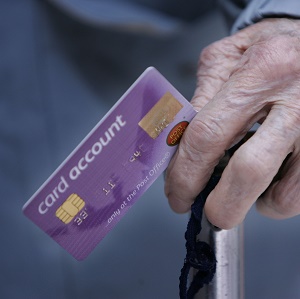Elderly trans woman blocked from claiming pension because the law sees her as a man

A 63-year-old transgender woman has been denied her pension because the Department of Work and Pensions views her as male.
In the UK, women can currently retire earlier than men.
Former soldier Sandra MacDougall of Glasgow had started receiving her pension last November, after passing the current female pension age of 63.
However, the Daily Record reports that Ms MacDougall has now been stripped of the pension, and told to wait until the ‘male’ pension age.
Ms MacDougal transitioned in 2000, has lived as a woman since then and her passport states that she is female.
However, the Department of Work and Pensions still insist that she is a man and requires evidence in the form of a Gender Recognition Certificate before allowing her to claim her pension.
If she is unable to do so, she will have to wait over two more years until she reaches the male pension age – in July 2017.
As Ms MacDougall transitioned before the Gender Recognition Act was introduced in 2004, which introduced Gender Recognition Certificates, the pensioner has never received one.
The process to gain a Gender Recognition Certificate from scratch also includes a mandatory two-year waiting period, by which time she will have received her pension anyway.
She explained: “I underwent male-to female gender reassignment surgery in 2000 and I was really ecstatic, thinking I was going to get the chance to really live my life now.
“After the surgery, I wasn’t given a certificate because they didn’t have them in those days. I knew who I was, I had a new passport, a new legal name and I really thought my life was taking off.
“But now, after all this time to be told I’ll not be receiving a state pension unless I can prove I’m a woman, is ridiculous.”
Ms MacDougal told the newspaper she is unable to return to work for health reasons, having undergone a triple heart bypass, and has recently had her disabled living allowance cut.
The male and female pension ages are already set to be equalised by 2020.
The Gender Recognition Act’s provisions for changing a person’s legal gender have been under intense scrutiny in recent weeks – as Parliament’s Women and Equalities Select Committee holds an inquiry into transgender issue.
Earlier this month, the committee heard oral evidence from trans people who warned that the current provision for changing your legal gender is a “humiliating” and “complicated” experience.
In order to gain a Gender Recognition Certificate, a transgender person is required to pay a £140 fee, get opinions from two medical professionals, submit ‘proof’ of living in their gender for two years, and convince a Gender Recognition Panel that their change is permanent.
Also this week, a 26 year old trans woman was ordered to serve a 12 week prison sentence in an men’s prison due to her lack of a Gender Recognition Certificate.

